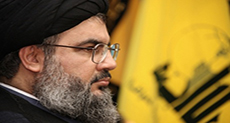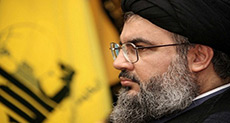
Swap will Require "Israel" to Pay Painful Price

Source: Al-Manar TV, 21-7-2008
Less than one week after the return of the remains of two captured "Israeli" soldiers in caskets, the State is preparing for the promotion of the deal to release captured soldier Gilad Shalit. A committee headed by "Israeli" Vice Premier Haim Ramon is set to convene in the near future in order to discuss rendering "Israel's" stance on the issue of detainee release more flexible.
An "Israeli" official said on Monday that "in the end, despite the strict negotiations we will hold with Hamas, "Israel" will have to pay a hefty price in murderers in order to bring Gilad home."
"Israel" has so far agreed to release 70 detainees out of those Hamas has demanded, and in total has approved the release of 320 out of 450 detainees. The debate is currently surrounding the rest of the names on the organization's list, and these are the decisions the committee headed by Ramon will have to make.
Besides the vice premier, other members of the committee include "Israeli" Foreign Minister Tzipi Livni, Internal Security Minister Avi Dichter, MK Ami Ayalon (Labor), and Justice Minister Daniel Friedmann.
Ramon's committee will be asked to once again hear the Shin Bet's stance, which firmly opposes the release of detainees "with blood on their hands". Despite the Shin Bet's objections it appears that many of the "Israeli" ministers support a change in policy. "There is no choice," one minister said. "The final decision rests with the State, and it will have to decide even if security forces remain opposed."
"Israeli" War Minister Ehud Barak believes that it is important to utilize the tahadiyeh (cease-fire) in order to push through a deal for Shalit. During discussions Sunday, Barak said he believed a gag order might be necessary, because Hamas may try to use the "Israeli" media in its bargaining.
This comes following the recent negotiations for Operation Al-Redwan, Barak explained, as well as "loose talk" from ministers who stated that Hamas will up its demands in exchange for Shalit.
Meanwhile, former United States President Jimmy Carter is trying to achieve a breakthrough in the negotiations over Shalit's release. A senior adviser to Carter, Robert Pastor, visited Occupied Palestine last week, as part of a regional tour that included visits to the Gaza Strip, Damascus and Cairo.
Pastor met with Shas leader Eli Yishai, and said that Carter would like to arrange a tripartite meeting with a senior Hamas figure. An "Israeli" source said that Pastor also presented a new initiative to expedite the deal.
Under the deal, "Israel" would release several dozen detainees a confidence-building measure, including Hamas parliamentarians and ministers arrested after Shalit's capture in June 2006. In return, Shalit would be brought to Egypt, where his family would be able to visit him. After this stage, negotiations for the release of more Palestinian detainees and Shalit's return home would continue.
EGYPT REMAINS HOPEFUL
Despite the fact that the Shalit deal appears to be tied down, Egypt is continuing in its efforts with Olmert's special envoy, Ofer Dekel, as well as with Hamas in Gaza.
The dialogue aims to reach an understanding that will enable the renewal of negotiations for Shalit's release. "Israel" will ask Hamas to yield certain names on its detainee list, though it will agree to the number. Hamas is demanding that "Israel" release all of the detainees on the list, and may even raise the amount to 1,000.
Following a discussion held at the "Israeli" Prime Minister's Office in Jerusalem on Sunday, an "Israeli" official told "Israeli" daily Ynet that "Hamas has adopted two ideas from the swap deal with Hizbullah. The first is that patience when dealing with "Israel" pays off to a degree, and the other was instilled upon witnessing the celebrations in Lebanon in preparation for the release of Samir Kintar. They are already multiplying this effect by 450, inside of Gaza's tiny population. This, in their opinion, will lead to Hamas' empowerment."
One of the major problems expected to occur during future negotiations, planned to begin in Cairo over the next few weeks, is Hamas' demand to open Rafah crossing. "Israel" is unwilling to discuss the opening of the crossing until progress is achieved on the Shalit deal.
Less than one week after the return of the remains of two captured "Israeli" soldiers in caskets, the State is preparing for the promotion of the deal to release captured soldier Gilad Shalit. A committee headed by "Israeli" Vice Premier Haim Ramon is set to convene in the near future in order to discuss rendering "Israel's" stance on the issue of detainee release more flexible.
An "Israeli" official said on Monday that "in the end, despite the strict negotiations we will hold with Hamas, "Israel" will have to pay a hefty price in murderers in order to bring Gilad home."
"Israel" has so far agreed to release 70 detainees out of those Hamas has demanded, and in total has approved the release of 320 out of 450 detainees. The debate is currently surrounding the rest of the names on the organization's list, and these are the decisions the committee headed by Ramon will have to make.
Besides the vice premier, other members of the committee include "Israeli" Foreign Minister Tzipi Livni, Internal Security Minister Avi Dichter, MK Ami Ayalon (Labor), and Justice Minister Daniel Friedmann.
Ramon's committee will be asked to once again hear the Shin Bet's stance, which firmly opposes the release of detainees "with blood on their hands". Despite the Shin Bet's objections it appears that many of the "Israeli" ministers support a change in policy. "There is no choice," one minister said. "The final decision rests with the State, and it will have to decide even if security forces remain opposed."
"Israeli" War Minister Ehud Barak believes that it is important to utilize the tahadiyeh (cease-fire) in order to push through a deal for Shalit. During discussions Sunday, Barak said he believed a gag order might be necessary, because Hamas may try to use the "Israeli" media in its bargaining.
This comes following the recent negotiations for Operation Al-Redwan, Barak explained, as well as "loose talk" from ministers who stated that Hamas will up its demands in exchange for Shalit.
Meanwhile, former United States President Jimmy Carter is trying to achieve a breakthrough in the negotiations over Shalit's release. A senior adviser to Carter, Robert Pastor, visited Occupied Palestine last week, as part of a regional tour that included visits to the Gaza Strip, Damascus and Cairo.
Pastor met with Shas leader Eli Yishai, and said that Carter would like to arrange a tripartite meeting with a senior Hamas figure. An "Israeli" source said that Pastor also presented a new initiative to expedite the deal.
Under the deal, "Israel" would release several dozen detainees a confidence-building measure, including Hamas parliamentarians and ministers arrested after Shalit's capture in June 2006. In return, Shalit would be brought to Egypt, where his family would be able to visit him. After this stage, negotiations for the release of more Palestinian detainees and Shalit's return home would continue.
EGYPT REMAINS HOPEFUL
Despite the fact that the Shalit deal appears to be tied down, Egypt is continuing in its efforts with Olmert's special envoy, Ofer Dekel, as well as with Hamas in Gaza.
The dialogue aims to reach an understanding that will enable the renewal of negotiations for Shalit's release. "Israel" will ask Hamas to yield certain names on its detainee list, though it will agree to the number. Hamas is demanding that "Israel" release all of the detainees on the list, and may even raise the amount to 1,000.
Following a discussion held at the "Israeli" Prime Minister's Office in Jerusalem on Sunday, an "Israeli" official told "Israeli" daily Ynet that "Hamas has adopted two ideas from the swap deal with Hizbullah. The first is that patience when dealing with "Israel" pays off to a degree, and the other was instilled upon witnessing the celebrations in Lebanon in preparation for the release of Samir Kintar. They are already multiplying this effect by 450, inside of Gaza's tiny population. This, in their opinion, will lead to Hamas' empowerment."
One of the major problems expected to occur during future negotiations, planned to begin in Cairo over the next few weeks, is Hamas' demand to open Rafah crossing. "Israel" is unwilling to discuss the opening of the crossing until progress is achieved on the Shalit deal.



